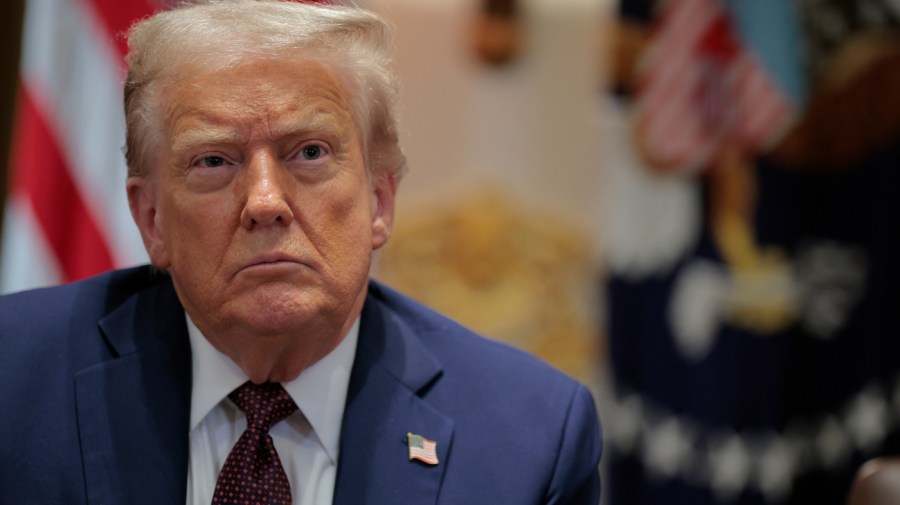US turns up heat against drug cartels in Caribbean: What to know

The U.S. military is turning up the heat against drug cartels in the southern Caribbean Sea, deploying several warships and other assets as tensions between Washington and Caracas escalate.
The spotlight on the buildup of U.S. forces in the region increased this week after President Trump announced that the U.S. military took out a boat with a “kinetic” strike, killing 11 people on board, whom U.S. officials said were members of Tren de Aragua, a group designated as a foreign terrorist organization by the U.S. government.
The president said that the vessel departed Venezuela and was shot in international waters. Trump added that the vessel was en route to the U.S. and that no U.S. servicemembers were injured in the Tuesday morning operation.
“Please let this serve as notice to anybody even thinking about bringing drugs into the United States of America,” Trump wrote on Truth Social. “BEWARE!”
On Friday, the president warned that if Venezuelan planes threaten U.S. assets in the region, they will be “shot down.”
When asked if the U.S. is seeking regime change in Venezuela, Trump told reporters at the White House that “we are not talking about that, but we are talking about the fact that you had an election which was a very strange election to put it mildly.”
“When I see boats coming in like loaded up the other day with all sorts of drugs, probably fentanyl mostly, but all sorts of drugs, we are gonna take them out and if people wanna have fun going on the high seas or the low seas…there are gonna to be in trouble.”
Even before Tuesday’s boat strike, Venezuelan President Nicolás Maduro, said the country has “declared maximum preparedness” as the U.S. military bolstered its maritime force in the Caribbean, in what the administration argued is an effort to combat threats from Latin American drug cartels.
Maduro, whose U.S. bounty for his arrest went up to $50 million earlier this year, said Monday that the administration’s military buildup in the region was an “extravagant, unjustifiable, immoral and absolutely criminal and bloody threat.”
Other top administration officials, including Defense Secretary Pete Hegseth and Secretary of State Marco Rubio, indicated that more strikes against drug traffickers in the Caribbean will take place.
“We’ve got assets in the air, assets in the water, assets on ships, because this is a deadly serious mission for us, and it won’t, it won’t stop with just this strike,” Hegseth said this week while on “Fox & Friends.” “Anyone else trafficking in those waters who we know is a designated narco-terrorist will face the same fate, and it’s important for the American people to protect our homeland and protect our hemisphere.”
Tensions flared on Thursday after two Venezuelan F-16 fighter planes flew near a U.S. Navy destroyer, in what the DOD said was a “highly provocative move” “designed to interfere with our counter narco-terror operations.”
The U.S. military deployed 10 F-35 fighter jets to Puerto Rico to aid in fighting against Latin American drug cartels.
The Treasury Department sanctioned the so-called Cartel de los Soles, characterizing it as a Venezuela-based criminal organization led by Maduro and other Venezuelan officials. The U.S. accused the group of drug and human trafficking, money laundering, sexual exploitation of women and children and extortion.
After imposing sanctions, the U.S. military began moving some assets to the region.
Now, the administration has at least eight warships, a nuclear-powered submarine, surveillance planes and over 4,500 Marines and sailors near Venezuela.
The USS Gravely and the USS Jason Dunham, two Aegis guided-missile destroyers, are currently in the southern Caribbean. The Hill has reached out to the Navy for additional comments.
USS Jason Dunham, which had two Venezuelan F-16s buzz by on Thursday, reportedly had another encounter with a Venezuelan fighter plane overnight Thursday, CBS News reported, citing DOD officials.
A Pentagon official, speaking on condition of anonymity, told The Hill on Saturday that the department is not “aware of a second incident involving Venezuelan aircraft near U.S. ship.”
Maduo said any U.S. military action would be met with a response and accused Rubio, who is also serving as Trump’s national security adviser, of attempting to lure the president into a conflict in the region.
After his bounty doubled in price, Maduo deployed some 4.5 million militiamen throughout the South American country, vowing to defend it from “extravagant, bizarre and outlandish” U.S. threats.
Trump hammered Venezuela on Wednesday, calling the nation a “very bad actor.”